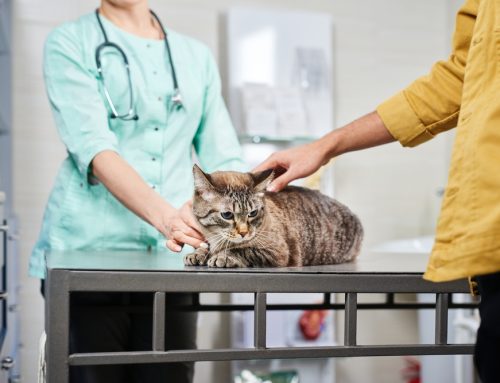Have you ever wondered why our veterinary team seems to be obsessed with your pet’s poop? A fecal sample is an excellent indicator of your cat or dog’s health. And, if the fecal sample reveals parasites, we can determine if those parasites are able to spread to you and your human family members.
According to a study completed by Kansas State University, 34 percent of dogs in the U.S. are infected with intestinal parasites. In the southeastern states, over half the dog population—54 percent—is carrying a parasite load. With all these pets carting around intestinal worms, humans are certainly affected as well. Three to six million people in the U.S. are infected with roundworms annually, leading to Toxocara larva migrans, a condition where roundworms travel throughout the body, potentially causing blindness and other serious problems. Unlike external parasites, such as fleas and ticks, many intestinal parasites are never seen. The only way to detect their presence and identify them is through a fecal examination.
What does a fecal exam detect?
Some parasites are easily identified (think “strands of spaghetti” or “grains of rice” in your pet’s stool). Other species, including the protozoan cysts, coccidia, and giardia, are impossible to identify with the naked eye. A fecal exam gives us the ability to correctly identify the type of intestinal parasite present. It also allows us to determine just how severe the parasite load is and if additional deworming is necessary.
How are fecal exams performed?
To correctly identify any intestinal parasites affecting your pet, we have to use a microscope to examine a fecal sample and check for parasite eggs. To do this, we prepare a small amount of feces—an amount the size of the tip of your finger is sufficient—to be examined. Surprisingly, it is much more difficult to identify parasites based on their adult stages, so fresh samples work best to prevent the eggs from hatching into more mature stages. If you can’t get your pet’s fecal sample to us quickly, stick it in the refrigerator.
How often do pets need fecal exams?
We know you’d prefer to handle your pet’s poop as little as possible, but we’d like to see it at least once a year. Including a fecal exam with your pet’s annual wellness examination gives us the most information and allows us to stay on top of your pet’s health status. In addition to a standard annual check, we recommend a fecal exam in these situations as well:
- New puppy and kitten visits (those adorable potbellies can indicate a heavy parasite load)
- Gastrointestinal problems (such as diarrhea or constipation)
- Lifestyle risks (traveling, training classes, dog parks, or visiting common areas frequented by other pets can all pose a parasite risk to your pet)
How are intestinal parasites prevented and treated?
Some parasites can live for years in the environment, so proper hygiene and cleaning protocols are necessary to prevent recurrent infections. Follow these tips to fend off a parasite infestation:
- Keep your pet’s living area clean
- Remove feces quickly and regularly
- Prevent your pet from eating wild animals that may carry parasites
- Utilize a monthly combo heartworm and intestinal parasite deworming preventive
When did we last take a look at your pet’s poop? Call us to schedule an appointment.









Leave A Comment